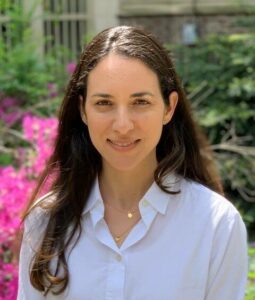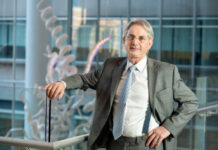
Estimates vary on the amount of people afflicted with long COVID.
It’s anywhere from 7.7 to 23 million Americans, according to the U.S. Department of Health & Human Services. It’s 9 million Americans, per the Centers for Disease Control and Prevention. It’s 65 million people worldwide, according to a January study from Nature Reviews Microbiology, a microbiology journal.
Regardless of the number, it’s a lot.
Millions of people feel tired, weak, dizzy or have one of the other symptoms. And they feel these months after COVID has ceased to be a pandemic that inspires daily headlines.
But a Jewish University of Pennsylvania assistant professor, Maayan Levy, is still thinking about them. The Israeli who lives in Philadelphia also may have found an answer that can help them.
Levy, 39, is the principal investigator in her own lab in the university’s microbiology department. In recent years, Levy and her team have studied long COVID. And last month, they published a paper in Cell, a biology journal, hypothesizing about its root cause.
They learned that “the molecule most significantly associated with long COVID was serotonin.” Serotonin helps with memory, cognition, appetite regulation, sleep and mood, according to Levy. Long COVID patients are suffering from a reduction in it, and that reduction starts in the gut.
Serotonin in the gut acts through the vagus nerve to affect the brain, according to Levy.
“Less activation of this nerve is due to a reduction in serotonin,” Levy said. “That leads to an impaired brain response and cognitive performance.”
Serotonin is distributed through the body in platelets, or cell fragments. COVID decreases the number of platelets in the body. That means less serotonin can be stored.
“We found it in some patients with long COVID: There’s a viral reservoir in the gut,” Levy said. “The start of the story is in the gut.”
Now that we’ve found a starting point, we may be able to figure out how to treat those suffering from long COVID. Serotonin is synthesized from dietary tryptophan in cells. Those cells then store serotonin in platelets. A possible remedy can be to “give patients more tryptophan,” Levy said. (This is no guarantee. It would need to go through a clinical trial first.)
These findings should also help clinicians develop tests to determine whether a patient is suffering from long COVID, according to the professor.
“We could potentially provide a new avenue for a new biomarker,” Levy said.
Levy got her Ph.D. from the Weizmann Institute of Science, in Rehovot, Israel, in 2017. She also met her husband, Christoph Thaiss, while studying there. They came to the U.S. in 2018 because Penn offered them the chance to open their own labs.
Levy wanted her lab to focus on metabolites, or compounds relating to metabolism, in cancer and other diseases. For two years, it did. But then COVID broke out.
“We like to do basic research in the lab but very clinically relevant research,” she said.
It’s what led to the October paper in Cell.
“Many researchers explored acute infection. Much less is known on the chronic condition,” Levy said. “Why do some develop long COVID and some not? How can the body overcome this and go back to normal? I was just very curious, and I am still.”
Levy has seen stories on social media about people who can’t get out of bed, work or complete basic tasks.
“It’s horrible,” she said.
“This is just the beginning of what’s happening with long COVID. “We’re just beginning to scratch the surface of what we can learn about this disease,” she added.
At the same time, Levy’s lab is back to studying other diseases, too.
“In terms of being out of the pandemic, research is back to normal. Hopefully, it stays this way,” she said.
Just as her work life has gotten back to normal though, her personal life has done the opposite. Since Hamas attacked Israel on Oct. 7, Levy has worried about her family. They are all still there. And luckily, they are OK.
The Philadelphian, who lives here on a green card, has put up posters of the more than 200 hostages of Hamas on Penn’s campus. She’s trying to be active, but she’s also trying to keep her head down and go to work.
“So many people are very, very loud. Shouting things like, ‘From the river to the sea,’” she said of Hamas sympathizers in the city.
Levy and Thaiss are trying to become American citizens.
“Until a week ago, I thought the U.S. was safe,” she said.






